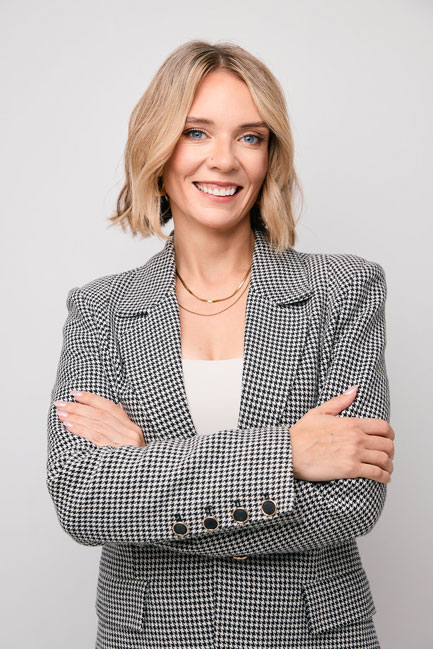
Ask the Alumni Expert: Heather Morrison (BFA’08)
USask graduate Heather Morrison, who studied drama in the College of Arts and Science, is helping people overcome the fear and anxiety associated with public speaking

University of Saskatchewan (USask) graduate Heather Morrison studied drama in the College of Arts and Science, earning her Bachelor of Fine Arts degree in 2008. Since then, she has worked as a freelance theatre artist, as the co-founder of Sum Theatre, as a broadcaster and an associate producer with CBC in Saskatoon, as a sideline reporter, and as a fitness coach.
Morrison has been celebrated in Saskatoon for her contributions to the arts and to the larger community. For example, in 2023, Morrison was honoured with a YWCA Women of Distinction Award in the Arts, Culture & Heritage Award category. In 2016, she was recognized by CBC as a Future 40 winner. In 2014, she received a USask Alumni Achievement Award, as a young alumni recipient, for her contributions to theatre, the arts, and volunteerism.
Morrison is also an entrepreneur. As the founder and president of Deliver Your Best Public Speaking Coaching, her goal is to help people at home and around the world conquer their fears around public speaking. The Green&White asked Morrison about studying drama at USask, her passion for public speaking, and how she is making a difference in people’s lives.
You earned a Bachelor of Fine Arts (BFA) degree at USask in 2008. What inspired you to study drama at the post-secondary level?
I couldn’t not! While I was a teenager, I had a chance to see a play at Greystone Theatre. I was overcome by this strong desire to be a part of what they were doing. At the beginning I was going to do a general Arts and Science degree with some drama classes, but I ended up pursuing a BFA.
Drama was the thing that could hold my attention and focus for hours. I wanted so badly to be the best I could possibly be. My classmates were all the same. We took it really seriously and challenged each other. We had some wonderful professors who invested as much of themselves into the work as we did. It wasn’t possible to step away from something so exciting.
Since graduating from USask, you have worked as a theatre artist, as a broadcaster in television and radio, and as a public-speaking and fitness coach. What led you to explore these diverse career paths?
I recognize that this seems like a very random career path but, to me, it always made sense. One reason for that is I’m incredibly motivated by being challenged. In new situations, I love figuring out how everything works and how I can excel. When I no longer feel the thrill of the challenge, I know it’s time to move on.
The other reason is everything I do is an effort to improve other people’s lives. In theatre and my work with Sum Theatre, I was deeply invested in creating community through experiences. In broadcasting, I always wanted to give my audience the feeling that, if they met me in person, we would become friends. I wanted to buffer the hard news and share the good.
Helping someone exercise is an easy way to improve their life. The most meaningful part of my fitness coaching journey was during the COVID pandemic. My friend, Grace, and I created an online community and provided free workouts for two years.
Now I am currently enjoying a fun challenge and making a significant impact on people’s lives. I am learning how to run a business, which is infinitely fascinating, and I am able to take away a problem that causes a significant amount of anxiety.
You are the founder and president of Deliver Your Best Public Speaking Coaching, and you have said that public-speaking coaching is your favourite thing to do. Why are you so passionate about it?
It’s my favourite thing because I am uniquely suited to the work. It draws on my background in acting, broadcasting, and fitness. It’s also a very personal matter for me. I used to be scared of public speaking— bizarre, I know, given my passion for performing as an actress. But I absolutely hated when I had to be myself in front of a crowd.
When I was trying to overcome my fear, none of the resources I could find were helpful. There are a lot of myths and misconceptions about public speaking. A lot of the advice passed down is recycled, regurgitated “feel-goodisms” that do nothing for someone who is genuinely afraid of public speaking.
Discovering techniques that actually worked and overcoming my own fear was powerful. It opened a lot of doors for me in my career. It also positively impacted other areas of my life. I want as many other people to experience that same transformation as possible.
Why do people often feel so nervous or frightened about public speaking?
It is normal and natural to fear speaking in front of a group. It is difficult to do something that is new or hard in front of an audience. Mistakes or embarrassing moments feel likely, and their significance is often overestimated. People—consciously or subconsciously—believe there are very valuable things at stake, like their job or reputation. This makes public speaking feel like a threat.
Some people feel this initial discomfort but have a positive experience, which “cures” their anxiety. Many other people feel the initial discomfort and it triggers a fear response that interferes with their ability to perform. Maybe their heart races, or their mind goes blank, or their voice shakes, etc. This can lead to embarrassment and/or dissolves the person’s sense of trust in themselves.
Next time they speak they don’t just have that initial fear, they now also fear the fear itself—and all its physiological symptoms. This triggers an even bigger response from their nervous system. This becomes a cycle.
Your goal is to transform even the most nervous people into confident and authentic speakers. How do you do this?
I break this cycle. I help people interrupt this pattern and give them actionable strategies to create a different experience.
Becoming a better public speaker isn’t just one thing, just like how becoming a better soccer player isn’t just one thing. To improve your ability, you have to work on your endurance, your quickness, your ball touches, and more. After working on this issue for years, I’ve discovered there are five key pillars to improving your experience of public speaking.
They are:
- Be able to calm your nervous system.
- Identify and shift any limiting beliefs.
- Prepare properly for every event.
- Support yourself with warm, realistic self-talk.
- Take the focus off yourself and put it onto your audience.
Within each pillar are different tools and strategies you can implement. When you work on all these internal aspects, you start to see external results. You’ll appear confident and authentic when speaking. You will be less nervous and more engaged with your audience. It feels like magic, but it’s not. It’s just effort.
What are some of your quick tips for people who may feel nervous or intimidated to speak in front of a group or a large crowd?
Accept that being nervous is going to be part of your experience. If you fight or resist those nerves, you are only going to make things worse.
Remove the idea that public speaking has to be perfect to be good. Connection is way more important than perfection. You cannot connect to your audience if you are worried about being judged. Tell yourself you can be visibly nervous and still do a great job, because that is the truth. The audience wants to like you. Go out with an attitude of “I like them, and they like me,” and you will feel a shift.
Many people procrastinate preparing for public speaking because it brings up uncomfortable feelings. Remember that when you’re practicing, you’re not just rehearsing what you’ll say, you are gaining experience in managing what you will feel. Use that as motivation to practice a lot!
Reflecting on your experiences as a public-speaking coach, what are some of your favourite success stories?
I had a college professor from the United States in my program who felt confident in front of her students but could not do any public speaking in front of the leadership team. Her voice would tighten and shake. She felt really embarrassed by the issue and would avoid speaking as much as possible. Using the tools and strategies from my program, her confidence improved.
About halfway through the program, she received an award from her college and was brought up to accept it in front of 7,000 people. She wasn’t sure if she was supposed to speak or not, but as she walked up to the stage she thought, “If I had to, I think I could.”
It turned out she didn’t have to do a speech, but the fact that she felt she could freed up her mind. Instead of being consumed by fear, she was able to relax and soak in the good feelings of accepting the award. Hearing about moments like that from my program participants is meaningful to me. When someone overcomes their fear, a huge barrier is removed. They are able to be more present and also dream about a future that is no longer limited.
What advice do you have for new USask drama alumni who are just beginning their careers?
If you are just starting out you most likely know this, but great advice I followed was to create my own work.
Saskatchewan artists are so crafty. Because of being isolated on the Prairies, work opportunities are limited. So, we created our own. We wrote grants, produced shows, devised work, paid for the rights to our favourite play from our own pocket. One generation would mentor the next. We were resourceful and we worked very hard.
You’re building incredibly valuable skills in leadership, organization, problem-solving, budgeting, collaboration, etc. You are making mistakes and learning from them. You are developing the courage to go after what you want. I was able to start a business because I built a theatre company from the ground up. Any move you make will serve you later. You truly cannot fail.


